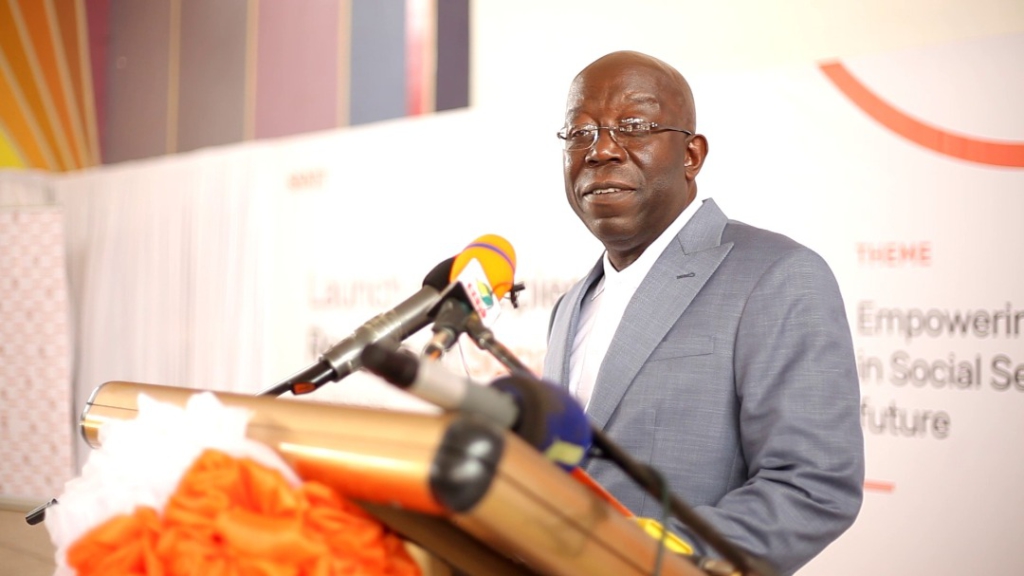Bussiness
Improving Pension Education: SSNIT launches Supplementary Readers Manual for basic schools

The Social Security and National Insurance Trust (SSNIT) has collaborated with the Ghana Education Service (GES) to launch the supplementary readers manual on social security for Junior and Senior High Schools (JHS/SHS).
The Supplementary Readers and Teachers’ Manual on Social Security for students and teachers is meant to deepen students’ awareness of social security issues.
The National Council for Curriculum and Assessment (NaCCA) was a major partner in the development of the manual.
Producing the manual involved breaking down the Pensions Act 2014, as amended to Act 883 into simple concepts for easy understanding.
The launch which was under the theme “Empowering the Youth with Knowledge in Social Security – Preparing For The Future,” was held at the Kumasi Anglican Senior High School in Kumasi.

Director-General of SSNIT, Dr John Ofori-Tenkorang, observed that in spite of the benefits the SSNIT Scheme provides, membership is relatively low which he attributed to a general lack of understanding about social security, the laws governing it and the value it provides.
He therefore said the manual would enable students to insist on their right to social security as potential workers or discharge well their responsibilities as future employers.
Dr Ofori-Tenkorang is hopeful that the initiative would equip the young ones with the requisite knowledge and information needed to achieve SSNIT’s goal of achieving social protection for all workers in Ghana.
Deputy Minister for Education, Rev. Dr John Ntim Fordjour, said the project was to raise the young learners as ambassadors who appreciated the essence of SSNIT contribution for a secured and comfortable future.
The Deputy Minister revealed that out of 11 million working population in Ghana, only 1.7 million were contributing to SSNIT, adding that the 227,000 beneficiaries currently on the monthly payroll of SSNIT could have been more if more workers had contributed to SSNIT during their active work period.
“As financial literacy is a key element in our standard-based and common core curricula, we hope to raise nearly 10 million learners in pre-tertiary schools with knowledge and values that are aligned to the key priorities of national development,” he added.
He acknowledged that introducing social security as part of the new Common Core Curriculum for schools is very significant for today’s education and the future of the scheme.

Rev Dr Ntim Fordjour also appealed to SSNIT to create similar supplementary readers for the early grades.
Meanwhile, Ashanti Regional Director for GES, Mary Owusu Afriyie, believes the initiative would equip the young ones with the knowledge on social security to adequately prepare them for retirement.
She encouraged all students and teachers to take full advantage of the initiative to upgrade themselves for a better future.
Source: www.myjoyonline.com
Bussiness
Charterhouse announces the Business Elevate Series with launch of ‘The Gastro Feastival’

Charterhouse, Ghana’s leading event management and audiovisual production company, is marking its 25th anniversary of delivering top-tier events with the introduction of an exciting new initiative: The Business Elevate Series.
This innovative series is designed to shine a spotlight on key economic sectors through a series of dynamic B2B and B2C events, including industry conferences, seminars, and exhibitions.
Kicking off the series is The Gastro Feastival, a groundbreaking annual food industry festival that will showcase Ghana’s rich and diverse food ecosystem and agribusinesses from production to consumption.
The launch event will take place on Friday, March 7, 2025, from 4:00 PM to 6:00 PM at the Grand Arena (Accra International Conference Centre).
This landmark event will bring together food industry stakeholders, enthusiasts, experts, and organizations to highlight the food industry’s critical role in Ghana’s socio-economic development and culture.
It will also promote food security, digital innovation, women’s empowerment, youth employment in agribusiness, and sustainable practices.
The Business Elevate Series is a game-changing initiative designed to foster growth and transformation across multiple sectors. With Charterhouse’s deep expertise in organizing impactful meetings, the series aims to unlock investment opportunities, drive innovation, and catalyze social and economic change.
The Gastro Feastival will address six major pillars that drive industry transformation: Investment Opportunities; Job Creation; Innovation, Technology, and Digitization; Youth Involvement (entrepreneurship and career opportunities); Women’s Involvement; Environmental and Social Governance (ESG); Export Opportunities
The event will also establish a Resource Bank, spotlighting key growth opportunities and ensuring the effective allocation of resources to transform Ghana’s food industry.
The Gastro Feastival is a Charterhouse initiative, with Kosmos Innovation Centre as the technical partner.
Bussiness
Ghana’s GDP shows economy is fast recovering despite DDEP – Finance Ministry

Ghana’s Gross Domestic Product (GDP) indicates a rapid economic recovery despite global challenges and ongoing debt restructuring, according to the Ministry of Finance (MoF).
The Ministry in a statement today indicated that latest data from the Ghana Statistical Service (GSS), cumulative economic growth for the second quarter (Q2) of 2024 reached 6.9%, a notable increase from the 4.7% recorded in the first quarter of 2024.
The MoF statement further noted that, “The economy’s robust recovery is in response to the macroeconomic stability and growth interventions that government is pursuing under our IMF-supported Post Covid-19 Programme for Economic Growth (PC-PEG).”
According to them, the overall real GDP growth for the first half of 2024 rebounded strongly, with year-on-year GDP growth averaging 5.8% for the period, significantly higher than the 2.9% recorded in the same period in 2023.
By Edem Mensah-Tsotorme
Read full statement below









